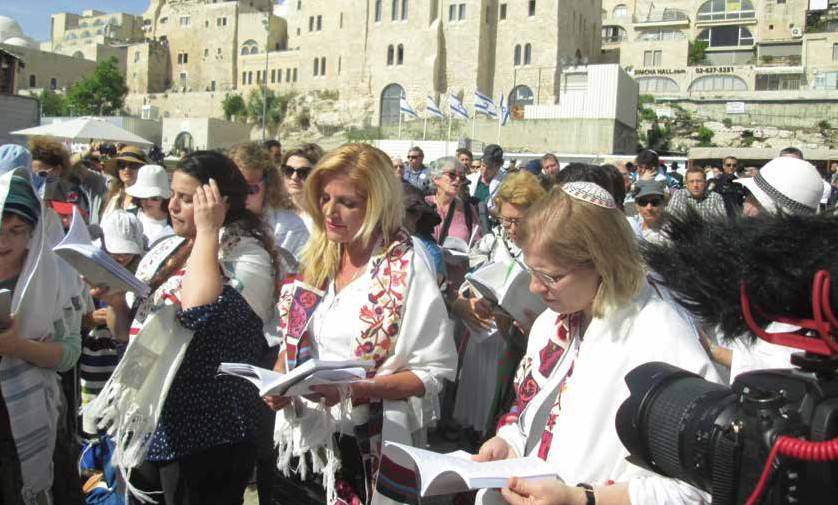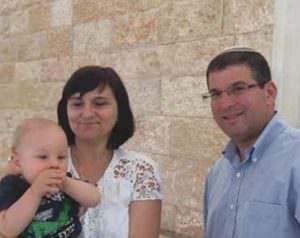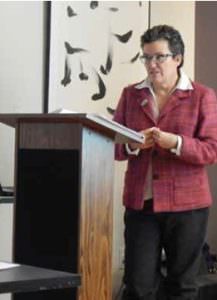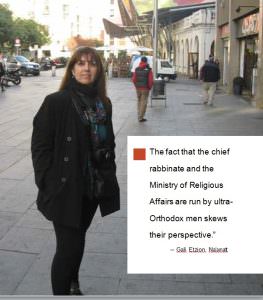Activist organizations, like Na’amat, are moving forward in the struggle for religious pluralism.
by MICHELE CHABIN
For years, Israeli organizations have been taking to the courts — and the streets — to chip away at the Orthodox establishment’s monopoly on anything Jewish, but neither the Israeli public nor the media have traditionally taken much notice.
That’s begun to change as Na’amat and other activist organizations have gone more public about their human rights struggles in a country with little separation between religion and state. They are making more of an effort and seeing more progress.
Though their clients vary and their approaches sometimes differ, what these groups have in common is their desire to challenge the monopolistic authority of Israel’s religious establishment, whose leadership has become increasingly haredi (ultra-Orthodox) and, in their opinion, much harsher and more closed-minded.
For many years, Women of the Wall has been advocating for the right to pray from a Torah scroll at the Western Wall.

Rabbi Jeffrey Woolf, a professor of Talmud at Bar-Ilan University, believes government policies that promote greater religious pluralism and inclusion should be voted in by the Knesset, not decided by the courts. But he understands why much of the public is disgruntled with the chief rabbinate and haredi political parties. “The haredi political parties and rabbis have essentially taken over the chief rabbinate and certainly control the holy places,” said Woolf, who is active in the arena for the development of Modern Orthodoxy in the United States and Israel. “They have imposed all kinds of strictures, including the separation of sexes in public places where it was never expected before.”
Woolf also blamed the chief rabbinate for setting the bar so high for potential converts, creating what he called a “conversion logjam.” He explained: “Their standards and bureaucracy are unparalleled in Jewish history. It’s part of a trend within the religious establishment and has nothing to do with halacha (Jewish law).” By taking such a strict approach, the chief rabbinate “has shot itself in the foot.”
In two recent opinion polls, Hiddush, an organization that advocates for “religious freedom and equality” in Israel and is definitely not a fan of the rabbinate, found that 71 percent of Israelis feel the rabbinate is distancing people from Judaism, while 75 percent want marriage to be under the authority of the secular family court and not the rabbinate.
Activists are increasingly petitioning the High Court of Justice, considered one of the most proactive supreme courts in the world, in the hopes of changing government policies on everything from divorce proceedings to conversions. Even when they win, however, these policies are in danger of being overturned by religious lawmakers and their coalition partners in Prime Minister Benjamin Netanyahu’s government.
Activists say the haredi leadership is trying to impose haredi norms on a public that is less than 10 percent ultra-Orthodox, and tensions are growing.
For years ultra-Orthodox rabbis tried to gender-segregate men and women on public buses that traveled through ultra-Orthodox neighborhoods, but the Israel Religious Action Center (IRAC), the Reform movement’s activist arm, won a court case against the practice in 2011.

Critics accuse the haredi leadership of turning the Western Wall, a national heritage site, into a de facto ultra-Orthodox synagogue where Jews cannot pray in an egalitarian service. At the same time, this leadership has vowed to prevent the government from keeping its promise to create and fund the first-ever official egalitarian prayer space at the Wall, at what is now called Robinson’s Arch. (It’s part of the Western Wall but out of sight of the main prayer area.)
Furthermore, haredi leaders who object to allowing Reform and Conservative Jews to convert in state-owned mikvahs (ritual baths) also oppose the Jewish Agency’s offer to fund alternative mikvahs.
The fact that the chief rabbinate, which has sole authority over Jewish status issues and institutions, and the Ministry of Religious Affairs, which is in charge of religion-related budgets and holy sites, are run by haredi men “skews their perspective,” said Gali Etzion, the attorney who heads Na’amat’s Legislative Department. “These are all-male institutions.”
Na’amat is at the forefront of the fight for women’s rights. In 2014, the organization petitioned the court to permit women to apply for the general manager position at the rabbinate’s rabbinical divorce courts. “This would bring a women’s perspective” to an all-male institution half of whose clients are women, said Etzion. “They say only men can be judges according to religious law, but there is no religious reason women can’t be administrators,” Etzion observed. The court suggested that religious authorities begin the process of inclusion by hiring a female deputy general, “but that was months ago,” Etzion said. “No one has been hired.”
Anat Hoffman, the firebrand chairwoman of Women of the Wall and executive director of IRAC, stated that the rabbinate and the religious establishment as a whole are “impinging on our lives, dictating life choices and not allowing the simple idea that there is more than one way to be Jewish.”
Hoffman ticked off the rabbis’ many spheres of influence: “Marriage, divorce, kashrut, shechita (ritual slaughter of animals), the mikvah system, Shabbat, who can be a state-funded rabbi, who can convert to Judaism and state funding of synagogues and institutions.”
She continued: “They have determined that young haredi men will graduate high school without practical skills [because they study only Jewish religious subjects] and whether they serve in the army. … They say women can’t sing or even speak in the public sphere and at national ceremonies. They’ve even decided when to end daylight savings time” in a bid to encourage more people to fast on Yom Kippur.
In short, the Israeli public “is fed up,” Hoffman asserted.
Among the several groups trying to change the religious status quo via the courts, one petitioned for — and won — the right for those preparing for non-Orthodox conversions to undergo their conversions in state-funded mikvahs. Another is demanding the right to pray from a Torah scroll at the Western Wall. (Haredi lawmakers in the Knesset Have since introduced a bill that would empower local religious authorities to decide who can and cannot use the mikvahs, hoping to thwart Reform and Conservative converts from using them.)
Others are attempting an end-run around the rabbinate by launching an alternative kashrut supervision system (a move struck down by the courts) as well as an alternative Orthodox conversion program.

In August 2015, Rabbi Seth Farber, a Modern Orthodox rabbi, founded ITIM, an alternative Orthodox conversion program and court system to help non-Jewish Israelis with Jewish ancestry convert to Judaism.
Farber believes “something has changed,” that the “public has stopped relying on the Knesset” to enact positive change and “has started to use the courts instead.” He also said that in addition to the courts increasingly activist rulings, Modern Orthodox Jews in Israel have become bolder in their bid to challenge the chief rabbinate’s monopoly.
Knowing full well that the government would not recognize his program’s converts, and many other converts who have undergone conversion in other Orthodox conversion courts not sanctioned by the rabbinate, Farber petitioned the High Court on behalf of a convert and her son.
ITIM asked the court to order the Interior Ministry, which sets citizenship criteria, to recognize their conversion in a haredi court outside the rabbinate’s jurisdiction. The historic April 2016 ruling, which said the state must recognize all Orthodox conversion programs both in Israel and abroad, “was a blow to the rabbinate,” Farber said.
Chief Sephardic Rabbi Yitzhak Yosef termed the court’s ruling a “scandal,” saying, “It is unthinkable that the private conversion industry, which is unsupervised by any state body, will be recognized as official.” Bezalel Smotrich, an Orthodox parliamentarian, vowed to submit to the Knesset a bill “giving recognition only to state-ordained conversions.”
Immigrants’ rights advocates hailed the ruling because it provides a solution for many non-Jewish immigrants who want to convert to Judaism but who consider the rabbinate’s conversion criteria — living a fully Orthodox lifestyle, with all that entails — way too stringent.
Unlike the rabbinical courts, Farber’s court converts children of non-Orthodox mothers as well as those whose parents cannot immediately promise to send them to Orthodox schools. “Russian immigrants see themselves as fully Jewish and their entire identity and sociological affinity is Jewish,” said Farber. “But the overwhelming majority aren’t religiously observant and the rabbinate has adopted a very, very high conversion threshold for religious observance.”
More than 300,000 Soviet immigrants (about 30 percent of all olim from the FSU) have no official religion. They immigrated to Israel under the Law of Return, which provides citizenship to those who can prove they had at least one Jewish grandparent.
On average, only 1,800 Israelis per year convert to Judaism, Farber said. And according to the Israel Democracy Institute, 50 percent of conversion candidates from the FSU are rejected by the rabbinate’s rabbinic courts at their first conversion hearing. Immigrants who don’t convert to Judaism and have no other stated religion are in some ways “second-class citizens,” Farber noted, because they cannot legally marry in Israel.
Marriage in Israel is performed only under the auspices of the religious community to which one belongs. A couple can marry in a non-Orthodox ceremony, but their marriage won’t be recognized by the government. They can live as common-law spouses or marry abroad and receive civil spousal rights via the Interior Ministry on their return to Israel, but the rabbinate will not register the marriage. Unless their children convert to Judaism, they, too, will be prohibited from marrying in Israel.

Etzion pointed out that non-Jewish immigrants aren’t the only ones denied the right to marry in Israel. Na’amat has gone to bat in court for mamzerim — Jews born out of a sexual relationship that is forbidden by Jewish law such as incest or an affair between a married woman and a man who is not her husband or the children of the second marriage of a woman who did not obtain a gett, the divorce decree issued by the rabbinical court. (Although both a husband and wife need each other’s permission to divorce, only the man may live with another woman and have children recognized as Jews, according to Jewish law.)
“We have a situation where people in Israel have the right to die for the country in combat, the right to pay taxes but don’t have the right to get married in their own country,” Etzion said of those with mamzer status.
Divorce in Israel can be even more problematic than marriage. When a woman refuses a divorce, the rabbinical court has the power to force the divorce on her. A man cannot be forced to give his wife a gett, though sanctions may be imposed if he refuses. In many cases, the husband’s power to refuse to give a gett is a bargaining chip (some call it extortion) for issues like shared property, alimony and child custody. Many women are required to waive their rights to receive the gett that they want.
Rabbinical court rabbis “have a lot of power over women,” Etzion said, citing cases where rabbinical court judges have set aside previous agreements by judges in the parallel civil court divorce court, often to the detriment of the wife. In this complex system, matters concerning division of property, child custody or alimony may be held in a civil family court, depending on which system was approached first.
Rabbinical judges “have the power to say no to the gett,” Etzion explained. “They can reduce child support. They can order the couple to try to reconcile even when the husband is abusive.”
She recounted how Na’amat represented a wife whose husband was about to leave Israel without giving his wife a gett. “The rabbinical court was trying to impose a financial settlement, but that’s something both sides needed to agree to, not something that should be imposed. The settlement was unfavorable to the woman. In the meantime, the court refused to declare him recalcitrant and said he could leave the country.”
In another case of gett refusal, Na’amat represented a wife who sued her husband for damages in civil court. “The rabbinical court told her, if you don’t withdraw the suit we’re not going to rule in favor of the gett,” Etzion said. “The rabbis have it in their power to impose sanctions like taking away the husband’s driver’s license, but they didn’t because, in my opinion, they wanted to impose their authority over the civil court system.”
Sometimes Na’amat works alone while at other times it collaborates on court cases with organizations like Mevo Satum, which advocates for agunot (literally “chained women”— women whose husbands cannot or will not give them a Jewish divorce).
“This is 2016, and from my point of view we can’t rely only on Jewish law in these proceedings,” Etzion said. “The same laws must apply to everyone. Child support must be based on the same criteria, across the board. It doesn’t matter if the person is Jewish or Muslim or Christian or secular.”
Susan Weiss, director of the Center for Women’s Justice (CWJ), articulates what many activists believe but won’t necessarily voice for fear of sounding too extreme. “The problem is not how the religious establishment operates. The problem is that it exists at all. We don’t want to fix the religious establishment — we want to remove it or at least its pernicious effects.”
The State of Israel “embraces” religion as part of its political and legal systems, Weiss said, “and this embrace causes severe harm to individual and human rights, especially when it comes to women.”
 The activist said CWJ is working “within the limits of the law” to “ameliorate, limit or rectify” rights infringements “and to prevent any further expansion of the religious establishment into the personal lives of Israeli citizens…or further harm to the democratic nature of the state.” For example, CWJ has asked the civil courts to reward compensatory damages if a spouse refuses to give a gett. “We can and should cause the civil arm of the state to acknowledge the abuse caused by the religious arm of the state,” she asserted.
The activist said CWJ is working “within the limits of the law” to “ameliorate, limit or rectify” rights infringements “and to prevent any further expansion of the religious establishment into the personal lives of Israeli citizens…or further harm to the democratic nature of the state.” For example, CWJ has asked the civil courts to reward compensatory damages if a spouse refuses to give a gett. “We can and should cause the civil arm of the state to acknowledge the abuse caused by the religious arm of the state,” she asserted.
Many of CWJ’s cases involve instances where, in the organization’s opinion, religious authorities have overstepped their authority, she said. “We represented a woman who wanted to use a public mikvah but was turned away because she isn’t married. We said the state has no right to ask questions and must provide services to all women. We have gone to [civil] court to say the rabbinical courts have no authority to ask women who are getting divorced who they have slept with. It’s not relevant.”
CWJ has handled a few cases, Weiss said, where the rabbinical divorce courts have questioned whether converts seeking a divorce are true converts. “The rabbis have questioned their religious commitment. We claim the court has no authority to ask such a question.”
In June, Tzohar, a Modern Orthodox rabbinical organization that offers a somewhat more liberal brand of Orthodoxy than the rabbinate to Israelis wishing to get married and in other areas, accused the rabbinate of retaliation against those who question its practices.
In a statement, Tzohar “condemned” the Ministry of Religious Affairs rabbinate’s decision to forcibly retire the Ethiopian community’s 67-year-old Chief Rabbi Josef Hadani, despite the fact that extensions are routinely given to state rabbis until they are 80. Rabbi Hadani had accused the Petah Tikveh rabbinate — an especially strict branch — of refusing to marry Ethiopian Jews, saying they are not Jewish. “Seemingly, his only transgression was his brave decision to stand in defense of Ethiopian Jews who had been denied the right to marry according to halacha by the Petah Tikvah rabbinate,” Tzohar said in a statement.
If the rabbinate has many detractors, it also has its supporters.
Leah Aharoni, the Orthodox cofounder of Women for the Wall, a group that has fought for the Orthodox status quo at the Kotel (in contrast to the egalitarian Women of the Wall), worries that the push to abolish the rabbinate “is part of a larger effort to transform Israel from a Jewish state to a state of all its citizens.”
Since its founding, Aharoni said, “Israel has been declared a Jewish state— the only one in the world to preserve the unique character of the Jewish people, the only one to serve as our national home.” She is convinced that for the “vast majority” of Israelis, “Judaism is synonymous with Orthodoxy,” even if they don’t actively observe the commandments.
For this reason, she explained, “attempts to change the nature of the Western Wall,” such as those led by Women of the Wall, “have simply failed to garner any traction because the overwhelming majority of Israelis are not interested in such reforms.”
“It is therefore the job of the chief rabbinate to maintain our unifying Jewish tradition,” Aharoni said. “I realize that the notion of a state religion sounds oppressive to most Americans, yet it is the reality in many democratic countries, including the United Kingdom, Argentina and throughout Scandinavia. Were Israel to become a secular state, it would in due course lose its Jewish nature, and that would be a tragedy.”
That being said, Aharoni thinks there is room for improvement on the part of the religious establishment. “I agree with the need for the chief rabbinate to become more ‘user-friendly.’ The notion that Torah observance is somehow overbearing is simply not true. It’s enough to take one look at the thousands of Chabad houses around the world, serving Jews from all lifestyles, from scrupulously observant to intermarried, to understand that traditional Judaism can be made accessible to all.”
Farber, the Modern Orthodox proponent of alternative approaches to Orthodox conversion, believes the rabbinate is learning a positive lesson from the frequent challenges to its authority. After ITIM petitioned the High Court to permit women to immerse in the mikvah privately, without an attendant present, the rabbinate said such an immersion could violate Jewish law. But, sensing it would lose the case, the rabbinate agreed to the condition.
Farber thanked the rabbinate for its flexibility. “They have their halachic position but understand there are more positions than just their own. I think this is a good example of allowing and respecting people’s rights that are different from those of their own. I think it represents a new model of how religious services can work in Israel.”
Hoffman, from Women of the Wall and IRAC, believes more Diaspora Jews should actively support Israeli initiatives for pluralism and an end to religious coercion. She said: “If Diaspora Jews want to see the kind of diversity they see at home in Israel, they need to fight for these values to take root in Israel. If the Jewish community capitulates to religious extremism, the entire Jewish world will suffer.”
Michele Chabin is a journalist living in Jerusalem. She covers the Middle East for the New York Jewish Week and other publications. She wrote “I’m BRCA Negative. Now What?” in our spring 2016 issue.
